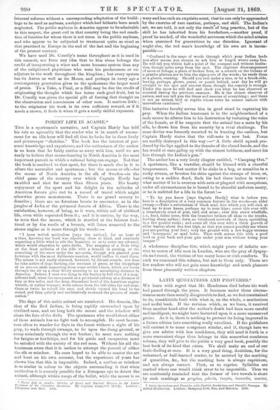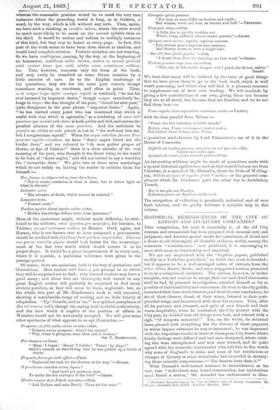LATIN QUOTATIONS AND PROVERBS.*
WE learn with regret that Mr. Henderson died before his work had passed through the press. It becomes under these circum- stances more than usually disagreeable to find, as we feel constrained to do, considerable fault with what is, on the whole, a meritorious and useful book. If the revision which, as we lbarn, it received froui another hand after the author's death had been more careful and intelligent, we might have bestowed upon it a more unreserved praise. As it is, there is nothing to prevent its being improved in a future edition into something really excellent. If the publishers will entrust it to some competent scholar, and if, though here we give our advice with less confidence, they will send it forth in a more convenient shape than belongs to this somewhat cumbrous volume, they will give to the public a very good book, possibly the best book of its kind that exists. We shall make an end of our fault-finding at once. It is a very good thing, doubtless, for the unlearned, or half-learned reader, to be assisted by the marking of quantities, &c., but the marking here is always capricious, and not always correct. First, as to caprice. Syllables are marked where one would think error to be impossible. Thus we are continually reminded that the former of two vowels is short by such markings as proprus, pueris, turpia, incendia, nesciat, • Latin Quotations and Proverbs, with English Renderings and Parallel Passages. By Alfred Henderson. London; Sampson Low, Son, and Marston. 1869.
whereas the reasonable practice would be to mark the very rare instances where the preceding vowel is long, as in Galatea, a word, by the way, which is left without any note. Then, again, we have such a marking as incidire ludum, where the error would be much more likely to be made on the second syllable than on the third. It would be useless and tedious to multiply instances of this kind, but they may be found on every page. In fact, this part of the work seems to have been done almost at random, and would need complete revision. Positive mistakes are not wanting. So we have naufragium, coming, by the way, at the beginning of an hexameter, muliebrem tollite lectern, multos in sentinel periculd misit venturi tinzor ipse mall, nitidae vestes ornatitinem reddunt, as. This, however, concerns only the form of the book, and may easily be remedied on some future occasion by a little exercise of care. As to the English renderings of the quotations, they are for the most part correct, though sometimes wanting in exactness, and often in point. Thus, ne te semper inops agitet vexetque cupido is rendered, " be not for over harassed by impotent desire," though semper manifestly be- longs to inops ; the fine thought of the poet, " Greed for ever poor," quite disappears in the poor phrase " impotent desire." Again, " he has carried every point who has combined that which is
useful with that which is agreeable," as a rendering of cantle telit punctum qui miscuit utile duke is both prolix and dull, and misses the peculiar allusion of the omne punctum. And the antithesis in populus me sibilat at mihi plaudo is lost in " the mob may hiss me, but I congratulate myself." When for neque imbellem feroces Pro- generant agleam columbanz we have "fierce eagles breed not the tender dove," and are referred to "do men gather grapes of thorns, or figs of thistles?" there is a clear mistake of the real meaning of the poet, who thought it the finest thing in the world to be born of " fierce eagles," and did not intend to say a word for the " unwarlike dove." We give two or three more renderings which do not satisfy us, leaving the reader to criticize them for himself :— Non fumena ex fulgore sed ex funto dare lucent.
" Nor to create confusion in what is clear, but to throw light on what is obscure."
Indomiter morti.
" The advance of death, which cannot be resisted."
Laqueata testa.
" Fretted roofs."
Podium sepultee distal inertice celata virtue.
" Hidden knowledge differs little from ignorance."
More of the quotations might, without much difficulty, be attri- buted to the authors ; omne ignotum pro magnifico, for instance, to Taeitus ; occupet extremum scabies, to Horace. Ovid, again, not Horace, who is not known ever to have composed a pentameter, should be credited with diznidium facti qui bens cc pit habet. Para um iton parvm amicitim plumes would look better for the re-arrange- ment of the last two words which would restore it to its proper shape. It would be a great improvement if in every case, where it is possible, a particular reference were given to the passage quoted.
Of course, there are omissions, both in the way of quotations and illustrations. Most readers will have a pet passage or so which they will be surprised not to find ; very learned readers may have a good many ; and those who are thoroughly well versed in any great English author will probably be surprised to find many
obvious parallels, as they will seem to them, neglected ; but, on the whole, this part of Mr. Henderson's book is well executed, showing a considerable range of reading and no little felicity of adaptation. "Up ! Guards, and at 'em I" is a spirited paraphrase of .Res ad truer-Los rediit, though the saying is of doubtful authenticity, and the view which it implies of the position of affairs at Waterloo would not be universally accepted. We will give some other specimens of what appears to us apt illustration :— Prosperunz et Felix scelus virtus vocatur.—SEN.
"Treason never prospers: what's the reason?
"Why, when it prospers, none dare call it treason."
SIR T. HARRINGTON.
Pro thescatro carbones.
" 'Rum' I hopes ! Baccy' I thinks! 'Tracts ' by jingo !" Sailor's remark on discovering that he has picked up a bottle of tracts.
Proposito fiorem prcetulit officio.—Peon.
"Neglected his task for the flowers on his way."—MoonE.
O preeclarum custodem ovium, lupzun
"And wer't not madness then
To make the fox surveyor of the fold?"—Suess.
Mutato ;tontine de te Fabula narraten—Hos.
"And Nathan said unto David, ' Thou art the man.' "
Corruptio optimi pessima.
"For men at most differ as heaven and earth ;
But women, worst and best, as heaven and hell."—TENNYSON.
Principiis obsta.—Ovm.
"A little fire is quickly trodden out Which, being suffered, rivers cannot quench."—S1LLKS.
Quisquis mnat servit ; sequitur captivus amatam. "Fair tresses man's imperial race ensnare, And beauty draws us with a single hair.
Sue sibi hunc gladiojugulo.'"—TER.
"I thank thee, Jew, for teaching me that word."—Sflaks.
Urticae proxima scepe rosy est.—OviD.
"Now, out of this nettle, danger, will I pluck the flower, safety."
SHAER.
We trust that many will be induced by the taste of good things that we have given them to go to the book itself, which is well worth possessing, and which they will find it a pleasant resource to supplement out of their own reading. We will conclude by giving a few contributions of our own, giving them not because they are at all novel, but because they are familiar, and we do not find them here :—
Failure cupido etiam sapientibus novissima exuitur.—Taarrus, with its close parallel from Milton :— " Fame, the last infirmity of noble minds."
Balnea, vine, Venus, corrumpunt corpora rostra, Sed faciunt vitam Guinea, viva, Venus,
a quotation made famous by Lord Palmerston's use of it in the House of Commons.
Dzificile est laudare puerum, non vent res sad apes est.—Cia. Corset successibus opto Quisquis ab eventu facto notanda putat.—Ouzo.
An interesting addition might be made of quotations made with a special historical application, such as that most felicitous one from Claudian, in a speech of Mr. Disraeli's, about the Duke of Welling- ton, Stilickoni3 apex et cognita fills& Canities ; or the graceful com- pliment which Mr. Gladstone paid the other day to Archbishop Trench,
Nec te tea plurima Pantheu
Labentem pietas nec infula texit.
The occupation of collecting is practically unlimited and of ever fresh interest, and we gladly welcome a valuable help in this volume.































 Previous page
Previous page